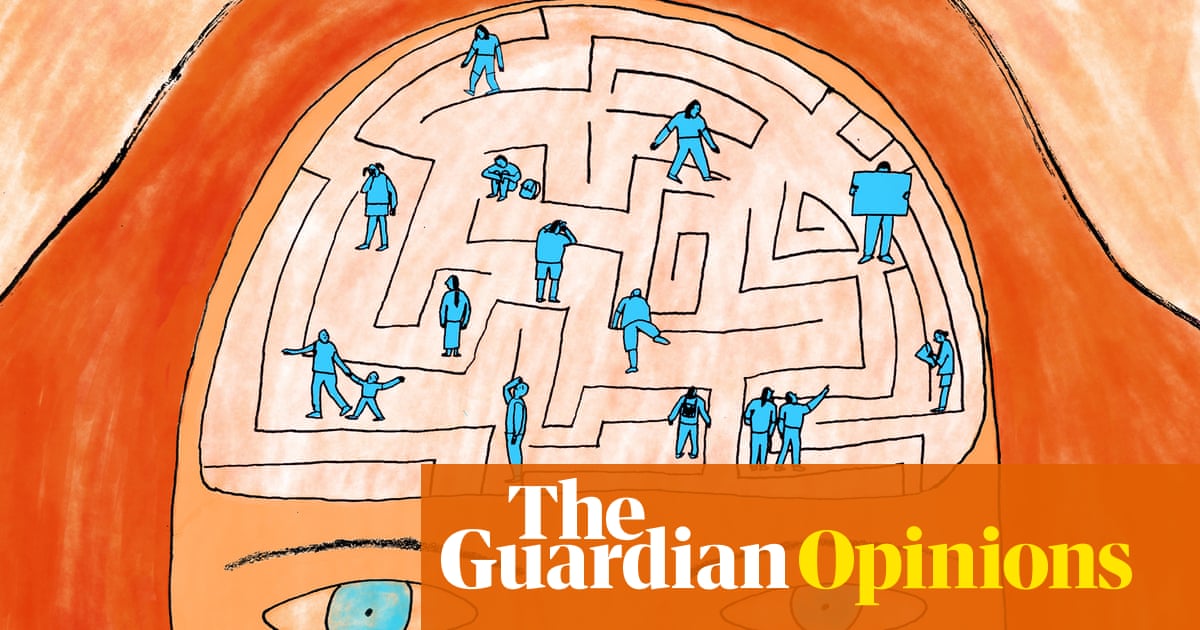
What kind of idiot falls for a conspiracy theory? Somebody gullible, you might imagine: at best someone vulnerable or mentally unwell, and at worst someone actively malicious. But mostly, to be blunt, not perfectly normal people like you and me. We are too rational, we tell ourselves smugly, to fall for some old guff about lizard people running the world, or Bill Gates wanting to microchip everyone, or the royal family secretly bumping off Diana, Princess of Wales. We go where the evidence takes us, follow the news closely, exercise our own judgment.
The bad news for those of us who like to think we’re immune, however, is that, according to the kind of research we probably pride ourselves on reading, intelligent people who consider themselves open-minded and curious enough to work things out for themselves can be surprisingly vulnerable to some strains of conspiracist thinking – at least where these tap into existing fears or prejudices. Which brings us to the festering mess of the Rochdale byelection, and its broader implications for British political parties.
Only Azhar Ali really knows why at a meeting of Labour councillors threatening to quit over Gaza he presented himself as a kind of 7 October truther, suggesting the Israeli government had been warned of what Hamas was planning but “deliberately took the security off” and allowed hundreds of its own people to be slaughtered just so they had an excuse to “do whatever they bloody want” in Gaza.
Only those in the room at the time, meanwhile, can explain why neither this bizarre outburst nor comments blaming “people in the media from certain Jewish quarters” for fuelling criticism of the pro-Palestine MP Andy McDonald (who has been suspended from Labour) were seemingly flagged up to party headquarters. But what I’ve learned from several maddening hours of arguing online with otherwise perfectly nice-sounding people who still can’t really see the problem with what Ali said is that a frightening number of people still don’t understand what a conspiracy theory actually is.
For a Labour party desperate to rid itself of cranks, in a climate where complaints of antisemitism expressed via conspiracy theories have almost doubled in a year, according to the Community Security Trust, that represents a pressing problem.
The chaos of the last few days suggests Starmer certainly has lessons to learn about handling complex cases like Ali’s, where Labour Jewish opinion was initially divided on how to respond amid fears of gifting George Galloway the seat. But even a leadership with its act thoroughly together can’t be everywhere at once, which means any party’s first line of defence is ordinary members challenging dangerous junk when they hear it and thus setting the social norm.
But doing that means recognising that the most insidious conspiracy theories don’t revolve around fake moon landings and tinfoil hats. They’re more likely to start from a kernel of fact that makes them sound plausible – in this case reports that the Israeli government fatally overlooked early warnings of something brewing in Gaza, much as the US government in the run-up to 9/11 tragically overlooked clues that Bin Laden was planning something big – before taking a quantum leap into the wild.
The hallmark of conspiratorial thinking is a quasi-religious conviction that nothing ever happens by accident, only by grand design, and that only people too naive to know how the world really works could think otherwise. When challenged, believers revert indignantly to that one original fact, before insisting they are entitled loudly to draw whatever conclusions they like from it. Don’t all those horrific images of mutilated Palestinian children suggest the Netanyahu government might be capable of anything?
The true conspiracy theorist doesn’t need evidence, just the boundless confidence – or arrogance – to conclude that their judgment is as good as any so-called expert’s now that they’ve done the hard Googling. And in their wake trails a small but vocal crowd of highly ideologically motivated followers arguing that you can’t prove it didn’t happen, so they don’t really see a problem with casually speculating that it might have. Even if that means embracing false flag theories claiming that Jews essentially brought their tragedy upon themselves, which have a very long and dark antisemitic history.
Some readers may be frustrated that a row about a Rochdale councillor seemingly consumes more airtime than the deaths of more than 28,000 Palestinians to date in this war, or worldwide alarm at the prospect of a full-blown Israeli assault on Rafah. Some activists will meanwhile complain, as they invariably do, that charges of antisemitism are being used to silence legitimate criticism of Israel. But anyone who thinks that being forced to stick to the facts somehow stops them talking about the horrors being livestreamed out of Gaza is nowhere near as good an activist as they fondly imagine themselves to be. The broader battle against conspiracy theories of all kinds seeping into public life matters, meanwhile, because these are not victimless beliefs.
Anti-vaxxer nonsense of the kind Ofcom inexplicably let the GB News presenter Neil Oliver get away with has the potential to cost lives in an outbreak. In the US, ridiculous smears about a political paedophile ring operating via a Washington DC pizza parlour ended in a man firing an assault rifle inside the restaurant. The risks of elected politicians amplifying and encouraging this stuff – whether cynically, for their own political gain, or because they actually believe it – couldn’t be more painfully obvious, yet are seemingly no longer much of a deterrent.
In Australia, rightwingers have used the Great Reset conspiracy – which holds that a mild-mannered World Economic Forum initiative to build back sustainably post-Covid actually masks a sinister plot to install a socialist world order – to attack their Labor opponents. Donald Trump openly embraces symbols of the far-right QAnon conspiracy movement at his rallies. Even the British transport secretary, Mark Harper, last autumn called 15-minute city strategies to keep cars out of congested neighbourhoods a “sinister” development. The advent of AI-generated, highly realistic “deepfake” audio and video means that conspiracy theories are likely only to become more slick and convincing, capable of fooling even the most sophisticated.
It has never mattered more that those in public life stick religiously to the facts; that anyone active in grassroots politics challenges conspiratorial thinking when they hear it; and that all of us learn to think twice when stumbling across something that looks too juicy not to share. Especially, perhaps, those who consider themselves far too smart to fall for anything so dumb.
Gaby Hinsliff is a Guardian columnist












